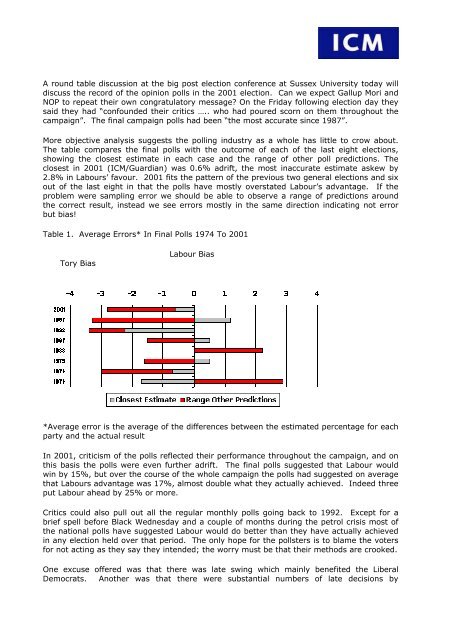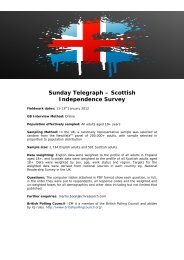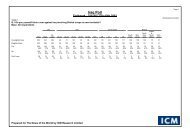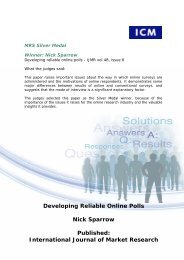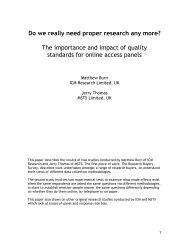Who's to blame for inaccurate polls? Nick Sparrow ... - ICM Research
Who's to blame for inaccurate polls? Nick Sparrow ... - ICM Research
Who's to blame for inaccurate polls? Nick Sparrow ... - ICM Research
- No tags were found...
You also want an ePaper? Increase the reach of your titles
YUMPU automatically turns print PDFs into web optimized ePapers that Google loves.
A round table discussion at the big post election conference at Sussex University <strong>to</strong>day willdiscuss the record of the opinion <strong>polls</strong> in the 2001 election. Can we expect Gallup Mori andNOP <strong>to</strong> repeat their own congratula<strong>to</strong>ry message? On the Friday following election day theysaid they had “confounded their critics ….. who had poured scorn on them throughout thecampaign”. The final campaign <strong>polls</strong> had been “the most accurate since 1987”.More objective analysis suggests the polling industry as a whole has little <strong>to</strong> crow about.The table compares the final <strong>polls</strong> with the outcome of each of the last eight elections,showing the closest estimate in each case and the range of other poll predictions. Theclosest in 2001 (<strong>ICM</strong>/Guardian) was 0.6% adrift, the most <strong>inaccurate</strong> estimate askew by2.8% in Labours’ favour. 2001 fits the pattern of the previous two general elections and sixout of the last eight in that the <strong>polls</strong> have mostly overstated Labour’s advantage. If theproblem were sampling error we should be able <strong>to</strong> observe a range of predictions aroundthe correct result, instead we see errors mostly in the same direction indicating not errorbut bias!Table 1. Average Errors* In Final Polls 1974 To 2001Tory BiasLabour Bias*Average error is the average of the differences between the estimated percentage <strong>for</strong> eachparty and the actual resultIn 2001, criticism of the <strong>polls</strong> reflected their per<strong>for</strong>mance throughout the campaign, and onthis basis the <strong>polls</strong> were even further adrift. The final <strong>polls</strong> suggested that Labour wouldwin by 15%, but over the course of the whole campaign the <strong>polls</strong> had suggested on averagethat Labours advantage was 17%, almost double what they actually achieved. Indeed threeput Labour ahead by 25% or more.Critics could also pull out all the regular monthly <strong>polls</strong> going back <strong>to</strong> 1992. Except <strong>for</strong> abrief spell be<strong>for</strong>e Black Wednesday and a couple of months during the petrol crisis most ofthe national <strong>polls</strong> have suggested Labour would do better than they have actually achievedin any election held over that period. The only hope <strong>for</strong> the <strong>polls</strong>ters is <strong>to</strong> <strong>blame</strong> the voters<strong>for</strong> not acting as they say they intended; the worry must be that their methods are crooked.One excuse offered was that there was late swing which mainly benefited the LiberalDemocrats. Another was that there were substantial numbers of late decisions by


